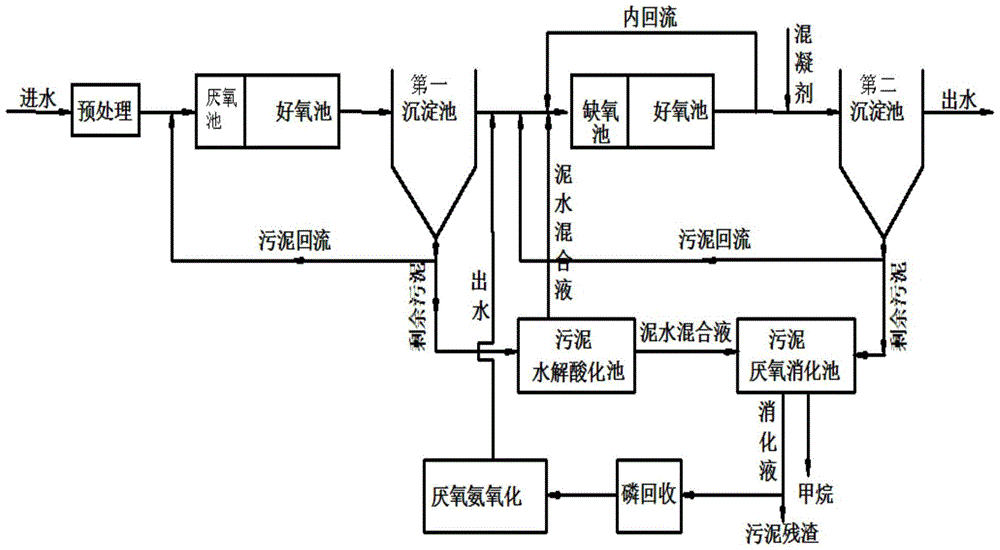A sewage treatment process and sewage treatment system
A sewage treatment and process technology, applied in water/sewage multi-stage treatment, water/sludge/sewage treatment, biological sludge treatment, etc., can solve the problems of increasing sewage treatment costs, lack of carbon sources, and low efficiency.
- Summary
- Abstract
- Description
- Claims
- Application Information
AI Technical Summary
Problems solved by technology
Method used
Image
Examples
Embodiment 1
[0083] Sewage is taken to the living area of Renmin University of China, and the treatment water volume is designed to be Q=4m 3 / d, according to the following steps for sewage treatment:
[0084] Step 1: Sewage is pretreated through grid grit settling to remove grid slag and sand with larger particle size;
[0085] Step 2: The sewage after grid grit treatment enters the anaerobic-aerobic unit, and the volume ratio of the anaerobic tank and the aerobic tank in the anaerobic-aerobic unit is 1:4;
[0086] In the anaerobic-aerobic unit, the sludge age is 3 days, and the hydraulic retention time is 1.5 hours;
[0087] Step 3: The mixed solution in the anaerobic-aerobic unit enters the first sedimentation tank for mud-water separation, the supernatant enters the anoxic tank in the anoxic-aerobic unit, and the activated sludge after settling and concentrating partly flows back to In the anaerobic tank in the anaerobic-aerobic unit, the remaining sludge is discharged into the slu...
Embodiment 2
[0105] Sewage is taken to the living area of Renmin University of China, and the treatment water volume is designed to be Q=4m 3 / d, according to the following steps for sewage treatment:
[0106] Step 1: Sewage is pretreated through grid grit settling to remove grid slag and sand with larger particle size;
[0107] Step 2: The sewage after grid grit treatment enters the anaerobic-aerobic unit, and the volume ratio of the anaerobic tank and the aerobic tank in the anaerobic-aerobic unit is 1:5;
[0108] In the anaerobic-aerobic unit, the sludge age is 0.5d, and the hydraulic retention time is 0.5h;
[0109] Step 3: The mixed solution in the anaerobic-aerobic unit enters the first sedimentation tank for mud-water separation, the supernatant enters the anoxic tank in the anoxic-aerobic unit, and the activated sludge after settling and concentrating partly flows back to In the anaerobic tank in the anaerobic-aerobic unit, the rest is discharged into the sludge hydrolysis dige...
Embodiment 3
[0128] Sewage is taken to the living area of Renmin University of China, and the treatment water volume is designed to be Q=4m 3 / d, according to the following steps for sewage treatment:
[0129] Step 1: Sewage is pretreated through grid grit settling to remove grid slag and sand with larger particle size;
[0130] Step 2: The sewage after grid grit treatment enters the anaerobic-aerobic unit, and the volume ratio of the anaerobic tank and the aerobic tank in the anaerobic-aerobic unit is 1:3;
[0131] In the anaerobic-aerobic unit, the sludge age is 5 days, and the hydraulic retention time is 3 hours;
[0132] Step 3: The mixed solution in the anaerobic-aerobic unit enters the first sedimentation tank for mud-water separation, the supernatant enters the anoxic tank in the anoxic-aerobic unit, and the activated sludge after settling and concentrating partly flows back to In the anaerobic tank in the anaerobic-aerobic unit, the rest is discharged into the sludge hydrolysis...
PUM
 Login to View More
Login to View More Abstract
Description
Claims
Application Information
 Login to View More
Login to View More - R&D
- Intellectual Property
- Life Sciences
- Materials
- Tech Scout
- Unparalleled Data Quality
- Higher Quality Content
- 60% Fewer Hallucinations
Browse by: Latest US Patents, China's latest patents, Technical Efficacy Thesaurus, Application Domain, Technology Topic, Popular Technical Reports.
© 2025 PatSnap. All rights reserved.Legal|Privacy policy|Modern Slavery Act Transparency Statement|Sitemap|About US| Contact US: help@patsnap.com



